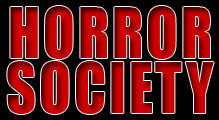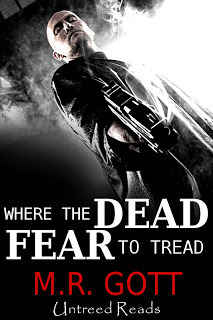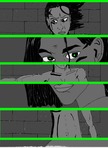M.R. Gott's Blog, page 34
November 16, 2011
40% off Where the Dead Fear to Tread
At Untreed Reads we're giving away 40% off one title coupons to all people who newly friend us on Facebook. If you send someone our way, be sure they mention your name so that you get one for referring them! This promo goes through November 30th!
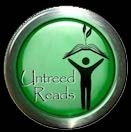


Published on November 16, 2011 17:30
November 15, 2011
M.R. Interviews........................ Gregory Lamberson
At times you score an interview way beyond your pay grade, please welcome Gregory Lamberson
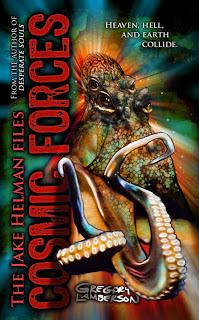
Jake Hellman is a perfectly flawed, well meaning protagonist, where did he emerge from?
That's a good question, because I was till in my twenties when I wrote the screenplay that became the first novel. I love nourish, hardboiled characters, and some of my favorite storytelling was on cop drama TV shows – WISEGUY, CRIME STORY, HOMICIDE. When I created the script, Jake was sort of my idea of what a hardboiled detective should be, which is to say he was formed by archetypes – and clichés. But more than a decade later, when I wrote the novel, I'd experienced quite a bit in NYC and was able to infuse a lot of my life into the character. Specific incidents – the shootout in the liquor store and the miraculous escape from death in the subway tunnel – are based on incidents that actually happened to me. The whole book was also influenced by 9/11, because I lived in NYC when that all went down.
Did you know Jake was series bound when writing Personal Demons?
Yes. When I wrote the first script, I envisioned a trilogy of movies. When I wrote the first novel, I envisioned a series of six books. Each book sets up something to come, and when certain things go down in the sixth book, I hope readers will be searching for clue I planted throughout the series. I love all of my creative children, but I have a special place in my heart for Jake, and I'm most proud of his adventures.
Does The Jake Hellman Files have a point you are working toward, or do you hope to keep Jake's adventures alive forever?
I would like him to keep on trucking. I know how this first set of six novels goes. On the chance that Medallion wants me to continue beyond that, I'm already formulating a second set of six. At one point, I had a closing trilogy mapped out that involved Jake's death – his real death – but I've re-jiggered those ideas into something more dramatic. If everything comes together, these 12 books will form one big ORIGIN for Jake Helman!
Was the combination of supernatural and science based horror difficult to balance when writing Personal Demons?
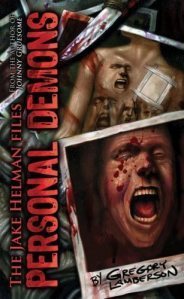
Not really. The science fiction angle really came about in the script. I reached page 28 and realized I hadn't found a first act point yet, so on the spot I made up the subplot about the genetic engineering. It was totally a kitchen sink approach. When I wrote the novel, I was careful to integrate those concepts more thoroughly into the narrative, which resulted in one of the book's central themes: scientific extremism vs. religious extremism, in a world threatened by terrorism.
In The Frenzy Way I thoroughly enjoyed the detective elements, was it difficult constructing a mystery where the reader knew it was werewolves?
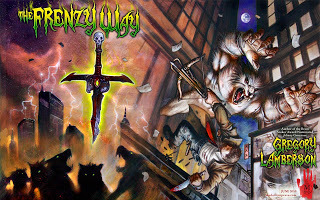
The Frenzy Way was also based on a screenplay I wrote in the late 1980s. Both The Greenwich Village Monster, as it was called then, and The Forever Man, which is what Personal Demons was called, were 95 page scripts that required a lot of research and development to become the novels they are. The werewolf script was very much "The Night Stalker meets Hill Street Blues" - but I always thought my central concept, that these are wolves who become humans instead of the other way around – was strong enough to carry the day. But what happened with that one was that I spent years researching the Spanish Inquisition, Native American mythology, and worldwide werewolf legends. I was never worried about keeping the mystery alive, I was worried about being able to pack in as much of my research as I could.
What can we expect from the upcoming Frenzy War?
First, the book comes out in June 2012, and it has an unbelievable cover. This makes me happy. The first book was a police procedural. This one is more like an espionage tale, or a story about rival terrorist cells. The Torquemadan werewolf slayers introduced in The Frenzy Way come to NYC on a mission that turns very bloody; we meet a lot more werewolves this time, and their society splits into factions; and there's a joint NYPD/FBI task force trying to keep all of this a secret from the public. So there's a lot of cloak and dagger going on. It's by far my goriest book, because I found I just had so much fun hacking off heads and limbs.
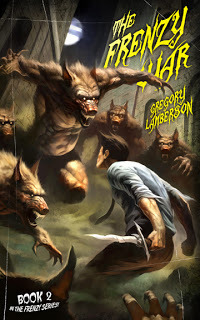
On the spines of your novels the genre is listed as horror. Despite the immense popularity of vampire and zombie fiction now why do you think so few book retailers have a horror section?
Sales, of course. Fantasy is in, SF is in, and horror seems to be in… one month of the year, unless your name is King or Koontz. I honestly don't know or understand a lot about this business. Whenever I get together with Adam Mock from Medallion, I listen to everything he has to say, because he really seems to have a handle on where this industry is heading. I can't say I like it all, but it's good to know.
Do you have any projects coming up the pipeline you would like to share?
As an author, 2012 is going to my biggest year: I have three books coming out. First up is a zombie novella called Carnage Road from Creeping Hemlock Press/Print Is Dead. It will be out in April, and I'm really encouraged by my publisher's reaction to it. Next is The Frenzy War in June, and it's so different from the first book while being so dependent on it – a real sequel – that I'm anxious to see how readers react to it. And October sees the publication of Tortured Spirits, the fourth Jake Helman novel, which is my biggest novel yet. I'm really pleased with the course the Helman books have taken, and I think this may be the best one. I should also mention that I'm currently writing a top secret project for Medallion that is the most challenging venture I've ever attempted, and I include my film work in that. It's really going to raise eyebrows when it's announced.
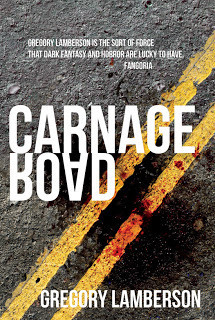
Published on November 15, 2011 13:50
M.R. interviews..........James Everington
Tell us about your novella The Shelter?The Shelter is a horror story, about a group of boys in the 1980s, trying to find and break into an abandoned WW2 air raid shelter. I doubt it will spoil it for anyone if I say that things don't go too well when they do.It's based partially on real-life events, and it's one of the first stories I ever wrote, over fifteen years ago. Recently I dug out the manuscript - it was dreadful obviously, all clichés and stilted language. But I found I quite liked the plot, so I decided to rewrite it from scratch, and try and combine some of that youthful enthusiasm with the better grasp of craft and language I (hopefully!) have now...
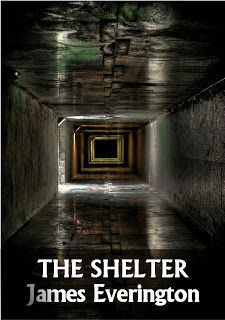
When writing Feed the Enemy did you have any concerns of accessibility for readers? Would you agree truly reflective stories regarding terrorism can be difficult to market?Well when I wrote it I wasn't thinking about market or commerciality at all; I was completely unpublished and clueless at the time. Nevertheless I wouldn't change it; the only concession I think an author should make to commerciality at the point of writing is to write the best story you can. Something original and true to yourself will sell better than a pale imitation of someone else.More specifically, I don't think Feed The Enemy is actually about terrorism; at least not in the action and heroic bomb disposal squad sense. Rather it's about the psychological effects that constant distortion of the terrorist threat by certain sections of the press and government might have on someone. Wow, it sounds even less commercial when I describe it that way!
The Other Room is a collection of your short stories. Is there a common thread between them?
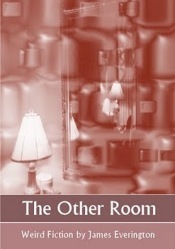 There's no common thread in terms of narrative; I hope that all the stories have the same feeling and tone - I enjoy the unexplained, the psychological, and the ambiguous in my weird fiction, and that is the kind of story I try and write.
There's no common thread in terms of narrative; I hope that all the stories have the same feeling and tone - I enjoy the unexplained, the psychological, and the ambiguous in my weird fiction, and that is the kind of story I try and write. How do you personally separate the horror genre from weird fiction?I guess the horror genre is a broad church, encompassing gore and entrails, the traditional ghost story, and... weird fiction. Which I guess I classify as those horror stories where the horror isn't just a monster or knife-lunatic running amok, but that horrible creeping feeling that something is wrong with reality or perception itself. Lovecraft's messed up geometry; the ambiguity of whether the ghost even exists in Turn Of The Screw; the total strangeness of Ligotti's tales.
What is the process you use when crafting your tales?I'm not sure to be honest - "process" is a pretty strong word for the stumbling, haphazard way I get a story down on paper. I always write my first drafts with a pen rather than on a word processor - it's less distracting that way, and I write way quicker than I type. Then I'll typically leave it a few months, and then do a second draft, again by hand. Then wait another few months, and then type it up and make final changes.Because I mainly write short stories I have a kind of production line of stories in first, second, and third drafts that I'm working on simultaneously.
What are your future writing aspirations?Artistically, I just want to write the best I can. Commercially, I have no driving ambition to become the next big thing; I think my writing is likely to be more of a niche/cult thing. What I hope for is to build up a core audience who like what I do, and are enthusiastically waiting for the next story or whatever. People who think like I do when there's a new book from an author I love – "Wow, there's a new James Everington out!". It would be pretty great to know even just a few people felt like that.
What author do you feel most influenced you? How? It would have to be Ramsey Campbell - I bought a second-hand collection of his short fiction at an impressionable age, called Dark Feasts. It made quite an impression - both that a so called 'genre author' could have a prose style equal to anyone's, and that short stories were such a natural fit for the horror genre. Those two realisations are probably what made me the writer I am, for good or for bad,
What is the most influential literary character to you personally? Why?Well, for a fancy dress party I once dressed as Billy Casper with his kestrel from A Kestral For A Knave. And I do like his stoicism and working class pride in that book; I have a picture from the film Kes (which was based on the book) in the room where I write.It was a quite last minute costume, so it basically consisted of a washing up glove tied on my wrist with a shoelace, with a cardboard kestrel I coloured with felt-tips. I couldn't get my coat off over the top of it so I spent half the party sweating.
If you could take the reins of writing for any existing franchise, which would you choose and why?Honestly, from an artistic point of view, none at all. I don't think it's particularly healthy from a creative point of view to obsess about another writer's work, and I'm not a massive fan of the current commercial trend that seems to want every book to be part of a series. If I have to pick one, I'll say Dan Brown's books. I'd "take the reins" by simply not writing anymore of 'em.
Published on November 15, 2011 13:41
SpotLight Thriller of the Week
Thanks to Books. Movies, Reviews! Oh My! for making Where the Dead Fear to Tread Thriller of the week.
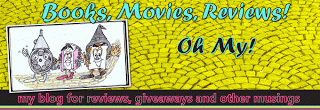


Published on November 15, 2011 13:38
November 14, 2011
M.R. interviews.........Vladimir Petkovic
We may say never judge a book by its cover, but many of us are suckers for a kick ass cover. Please welcome Vladimir Petkovic
Tell us about your role at Morpheus Tales. How did you begin working there?
As for myself, I'm a big Horror and Sci-Fi fan, so while I've been regularly on Myspace, I accidentally popped on page of Morpheus Tales, which had a dozen of topics and themes from horror genre, that intrigued me. So, I've contacted Adam Bradley, a main man from Morpheus Tales. That was back in 2009. He saw my artwork and gave me the chance. I've tried out with the story ''Magnificent Maggot Face'' written by N J Buchanan, for which I did two illustrations. Adam liked the style of mine, and the way I visualized the story. From that point, I've became regular illustrator of the magazine. So far, I did 8 illustrations and one cover artwork, from which five illustrations are published, and other will came out in time. Last one is planned for mid of 2012.or something.
Of the works you have had published which do you feel is the best representation of yourself as an artist? How so? Maybe the illustration for ''Magnificent Maggot Face'', because I incorporated all my inking techniques inside of that artwork. Surely, I progressed much from that drawing, because that was done two years ago, but still I'm very proud on that work.
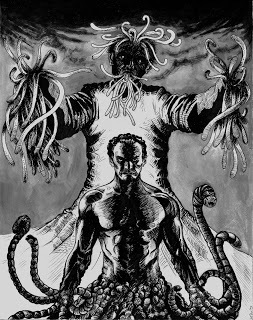
Of your unpublished works which do you have the greatest affinity for? Why?
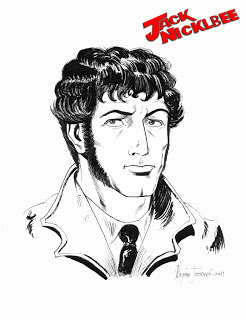 Definitively that's my own Comic character Jack Nicklbee, a detective from Chicago, who's is placed in crazy 80's, where he deal with various human and let's say a bit of unnatural horrors of mankind. I got tones of panels and illustrations with his adventures. That's the character that have ''haunted'' me since my childhood days. I'm taking on big hopes that his episodes will be published somewhere.
Definitively that's my own Comic character Jack Nicklbee, a detective from Chicago, who's is placed in crazy 80's, where he deal with various human and let's say a bit of unnatural horrors of mankind. I got tones of panels and illustrations with his adventures. That's the character that have ''haunted'' me since my childhood days. I'm taking on big hopes that his episodes will be published somewhere.
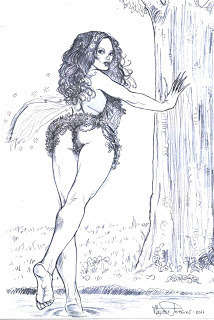
As the matter of fact, I'm already looking for the publishers that may be interesting in publishing of such comics. If nothing happened in some time, I'll try out to publish the comic on my own, as I do have plans to set up my own art and publishing studio. Besides that, I'm a big fan of Slavic mythology, and I did a big amount of paintings that contains characters, like fairies, demons and gods from that Ancient era of Slavic history. I will promote those paintings at the beginning of next year exposition in Belgrade, and afterwards, I'll see where I could offer them to be published, I'm mainly targeting on books which will deal with such thematic.
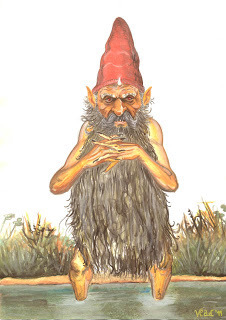
What is your creation process like? Do you use models or any reference when you begin?
It depends on matter of form. When it comes to draw things I've never seen before, no matter are they shapes, buildings, figures in strange poses…I use models, or documentation which is very important for me, when I get in some situation to draw or paint something complex or completely new to me. Also, I'm doing couple of preparing studies before I get into the serious drawing. Otherwise, when I go for things I'm into, I start off with the plane pencil sketching which is mainly the doodle thing. Then I use another pencil work that's more detailed and completed, before I go with the inking or color work.
Color or Black & White, how do you decide which to use for any given piece? It depends how I see it in my head. When idea comes to me, I imagine in my head how would it be. If I seen it as black n' white I go that way. If I see it in color, I go for the color. Of course, there are situations when I during the primary drawing with pencil get in mood to switch from let's say imagined black n' white form to color version. But again, I mostly stick to the way I seen it in my mind.
What is your favorite image? How has it influenced you?
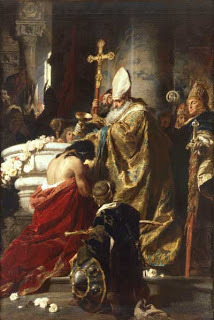 When it comes to painters and images, I'm a big fan of (at first place) Serbian painters like Pavle Jovanović and Petar Meseldžija, which entirely opus amuses me a lot and above all motivates me to work. You know, when you see something astonishing in field of your interest and playground, you just get yourself in mood to be motivated and go for the best you can do, or you just drop your jaw on the floor and stop doing what you do, because you know you can't do it. Besides them, I'm founding myself very inspired and motivated to work by works of Hungarian icon Gyula Bencuzur, one of the most completed European painters of all times. His painting, ''Baptism of Vajk'' is one of my favorite images of all time. No matter what I'm doing, drawing or painting, I always keep that painting at my side, because it's look and the way Gyula blend the composition with all the details and colors influences me a lot to give the best I got, when I work. It's just something that gives me the strength and creative flush to go forward.
When it comes to painters and images, I'm a big fan of (at first place) Serbian painters like Pavle Jovanović and Petar Meseldžija, which entirely opus amuses me a lot and above all motivates me to work. You know, when you see something astonishing in field of your interest and playground, you just get yourself in mood to be motivated and go for the best you can do, or you just drop your jaw on the floor and stop doing what you do, because you know you can't do it. Besides them, I'm founding myself very inspired and motivated to work by works of Hungarian icon Gyula Bencuzur, one of the most completed European painters of all times. His painting, ''Baptism of Vajk'' is one of my favorite images of all time. No matter what I'm doing, drawing or painting, I always keep that painting at my side, because it's look and the way Gyula blend the composition with all the details and colors influences me a lot to give the best I got, when I work. It's just something that gives me the strength and creative flush to go forward. What are your professional aspirations?
My professional aspiration is to establish my own drawing and publishing studio where I would be able to release my own creations, comic book characters and heroes. I suppose it's little bit hard to realize such thing due to the economical crisis, but in period of time like one or two years I'll surely set up some professional studio that will be concentrated on releasing of comic books and illustrations for books and magazines, or maybe even artwork for bands albums.
What visual artist has had the greatest impact on you?
Besides the painters I mentioned before, people that made a major influence on my work in field of comics and illustration are Roberto ''Magnus'' Raviola, Frank Frazetta, Roberto Diso, Fabio Civitelli, Massimiliano Frezatto… but of course, I've never tried to be their copy or someone who exploiting their style. I've just picked up some details and incorporating them in my own way, so the work can be recognized as enough original and my own. It's good thing to picking up on influences and grown besides some styles and approach which gives you opportunity to develop your own approach and creative shape, but it's really important do don't let yourself overwhelmed by those influences, and become their shadow or someone who pattern their style to the bone.
Published on November 14, 2011 13:34
November 11, 2011
M.R. Interviews........Shawn Riddle
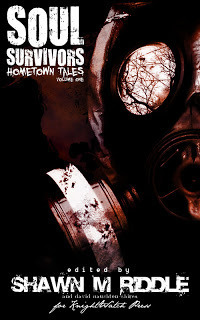
What is your most recent project?
My most recent project is the anthology called "Soul Survivors Hometown Tales Volume One" which was just released on Halloween of 2011. I supplied one story for this anthology as well as compiled and edited it. Volume Two is due for publication this spring. Among my other upcoming projects as editor are the soon to be released "The Blue, The Grey, and The Scarlet" Anthology of Civil War horror stories and "Vampyres – A History Written in Blood" for Knightwatch Press. One last mention is my upcoming release of a collection of stories with fellow Author Eric S. Brown, "The Man in White and Other Tales" from Snakebite Press in early December.
What is the strongest appeal for readers of this most recent project?
The release of "Soul Survivors" has an appeal to anyone who enjoys apocalyptic fiction. Volume one contains 13 stories written from the perspective of witnesses to the end of almost everything. From Plagues to Zombies, Werewolves to Aliens this collection has a little bit for everyone from some already known authors plus many new and rising stars in the genre.
Tell us about KnightWatch Press.
KnightWatch Press is a new publisher which produces Comics, Anthologies, and Novels all based in the horror/Sci Fi genres. I work for David Naughton-Shires at KnightWatch as an Editor and consultant. We have many new and interesting projects on the horizon, KnightWatch will be a force to reckon with in calendar year 2012.
What is the process you use when crafting your tales?
It's funny, many people are hyper organized about their writing. Outlines and carefully thought out plot lines. I normally get inspiration at the oddest times, when cooking, talking a walk, shopping, etc…. It is usually in the form of an opening line of a story. My short story "The Damned" was created strictly from the first line of the story that popped into my head, I began to write it and let the story flow. That is pretty typical of my writing style, any mistakes or plot holes I easily fix in the editing process.
What is your favorite character that you created? Do you love or hate him/her?
I would have to say Sgt. Diana Ortiz from my first story "The Four of July". She is heavily based on my sister in law. I like and always have liked strong female characters. She doesn't take guff from anyone and she's tough as nails. I plan to bring her back for a sequel story in my next collection. I definitely love this character and she will be kicking even more undead butt in the near future.
What are your future writing aspirations?
After I complete these next few anthologies for Knightwatch, I plan to write a novel based on my short story "Lockdown" which will soon be appearing in KnightWatch Press's anthology "Code Z". It has a solid base of characters and I did a lot of research on the virus I used as a template for my story. I have high hopes for this novel, after that is complete, the sky is the limit. Who knows where my writing will take me next?
What author do you feel most influenced you? How?
Without question, author David Moody of the "Hater" and "Autumn" series. There are too many reasons to get into, but the number one reason is how much I enjoy his books. No one creates a mood and situation better in my opinion, He draws you right into the characters mind and you feel everything he/she feels at the time. I have never spoken to anyone nicer and more humble than Mr. Moody and he has been very supportive of mine and many other authors over the two years I've known him. I ended up creating a fan group on Facebook for him called "Moody's Survivors" which has evolved from a fan based group into a community of writers, artists, publishers and fans of the apocalyptic genre.
What is the most influential literary character to you personally? Why?
That's a tough one, but I would have to say Danny McCoyne from David Moody's "Hater" series. He starts out as just a regular Joe, me, you anyone. He has bills to pay, rotten kids and a nagging wife. His work life is mediocre at best and he has been shuffled from one dept to another in his job for years. The fact that this man is able to survive the holocaust of the book and become one of the more important members of his group amazes me. His evolution is amazing but he never truly loses sight of who he is and what is really important in life no matter what happens to him.
If you could take the reins of writing for any existing franchise, which would you choose and why?
I would have to say the "Joe Ledger" series of books by Jonathan Maberry. Anyone who has read "Patient Zero", "The Dragon Factory", and "The King of Plagues" could tell you that Joe Ledger is a fun character to read. I think he would be even more fun to write about. The man is the textbook definition of "Bad Ass". Backed up by an elite team of soldiers and an almost unlimited supply of the most state of the art toys imaginable, it would be intriguing to see what I could do with him. Of course I would never presume to think I could outdo Jonathan Maberry, the man is a master.
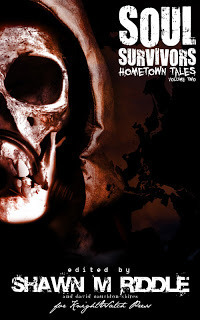
Published on November 11, 2011 10:08
November 9, 2011
M.R. Interviews.......Armand Rosamilia
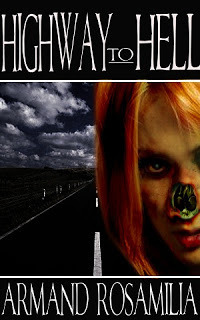
Tell us about Highway to Hell?
Not only is it my favorite AC/DC album, but it's also my extreme zombie novella. When I say extreme I mean it, too. In this world the zombies don't want to just bite you and eat you, they are trying to rape you. The opening scene is pretty hardcore but then (I'd like to think) it settles down and gives you a nice story about a man trying to survive in the zombie apocalypse. And not get violated by the undead.
Describe Dying Days for us.
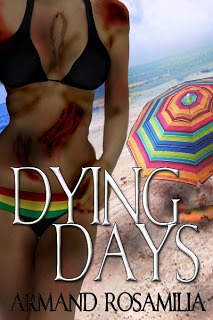 While set in the same world as Highway To Hell, this novella is more concerned with the heroine Darlene Bobich and her survival in Florida, and trying to find her place in this undead world.
While set in the same world as Highway To Hell, this novella is more concerned with the heroine Darlene Bobich and her survival in Florida, and trying to find her place in this undead world. What separates your zombie stories from those readers will be traditionally used to?
I'm not trying to break the mold with my zombies, but I do give them that extra insanity with them still being brutal and 'sexual' creatures… I'm actually working on a prequel to Dying Days (with everything leading up to Dying Days) called Darlene Bobich: Zombie Killer and the sequel, Dying Days 2 (which will have a bit of a surprise about the zombies)… AND a short story collection set in the world called Still Dying: Scenes From Dying Days. Busy, busy…
Do you think George A Romero's zombie work limited what could be done with these creatures, because of the success and recognition he found?
I think he set it in motion like Stoker did with vampires, giving the initial blueprint for future writers. It's up to everyone else to update them, put a new spin on it, or just run with what Romero did in an entertaining way.
What is the process you use when crafting your tales?
I start with the basic 'what if?' in a situation and then start writing it. Simple as that sometimes. If I have a basic idea in my head or especially a character I need to get it down… I can always go back to it later and play with it, although I find my initial ideas are usually the keepers.
What is your favorite character that you created? Do you love or hate him/her?
Darlene Bobich is the most familiar to me, because I've written about 100,000 words on her with more to come… I know her to a point but she surprises me at every turn. She's human and not a superhero, and she gets emotional and lost and freezes, but in the end she survives and fights her way out of situations. Every morning I grab a cup of coffee and sit down to see what she'll do next.
What drew you to the zombie sub-genre? Are there other classic monsters you hope to tackle in the future?
I've always been a huge zombie movie fan but never read any fiction until The Rising by Brian Keene. After that I couldn't get enough and eventually started dabbling in it. I never wanted to just start writing yet another boring zombie tale, with shambling undead chasing a bunch of students or fighting the military. For me, vampires have been done to death (pun intended). I wrote one vampire story and it made fun of the sparkly vampires. That's pretty much all I have to say right now, so don't expect more tales of vampires from me. I'm not a big werewolf guy either. I grew up on King and Koontz, where half the time it was a bad human who was the evil one and not some vampire or mummy or walking corpse. My non-zombie work tends to deal with humans and the weirdness around them. I'm a huge Lovecraft fan and love his heavy dread that hangs over each story, and I keep that in mind when I'm writing.
What is the difference in your process between writing short stories and novels?
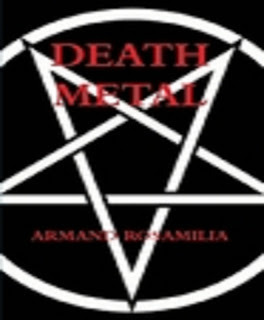 There isn't really a difference. I've begun short stories that ended up being novellas (my Death Metal urban horror one is a prime example), and big ideas for novels that ended up being great 5,000 word tales. I love to get into the character's head and see where they take me. For me, writing a great tale is trying to get down ideas as quickly as I can while watching the characters run with the plot.
There isn't really a difference. I've begun short stories that ended up being novellas (my Death Metal urban horror one is a prime example), and big ideas for novels that ended up being great 5,000 word tales. I love to get into the character's head and see where they take me. For me, writing a great tale is trying to get down ideas as quickly as I can while watching the characters run with the plot. What writer most influenced you as an author? How?
Dean Koontz as a teen, because even then I wanted to write and could see his structure book after book. Some people rip him for his formula, but as a kid trying to learn it, it was perfect. My first twenty stories were heavily Koontz-influenced (and horrible).
If you could take the reins of writing for any existing franchise, which would you choose and why?
The Necroscope series from Brian Lumley always fascinated me, because it was so rich in its history and (as a writer) I read those books and thought a lot of 'what if?' ideas. So many back-stories and new characters could be added, especially ideas set in the first three book's timeframe. And the Lovecraft inspiration is dear to my heart as well…
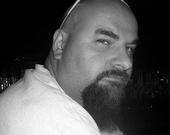
Published on November 09, 2011 14:03
November 8, 2011
Where The Dead Fear To Tread at the Horror Society
Published on November 08, 2011 13:54
November 7, 2011
M.R. Interviews..... B.E. Scully
Tell us about Verland: The Transformation?
Verland is the result of the confrontation/contemplation of death that overwhelmed me after my father's sudden and unexpected death several years ago. I became completely preoccupied with questions of immortality, loss, and how to somehow move forward and embrace life in the face of so much darkness and uncertainty. So out of all of that came a mystery-murder, historical-thriller Gothic novel!
What separates Verland: The Transformation from the plethora of vampire novels coming out now?
That a vampire is one of the central characters is completely secondary to the novel's many complex and interwoven themes. So many readers have responded to the character Verland as an exploration—and affirmation—of humanity in all of its darkness and light. In this way, Verland has nothing in common with either the blood-drenched "monster" or the pop culture pin-ups dominating the genre right now. He's the classic Gothic outsider in our surreal and often isolating modern world.
What do you personally look for when searching out vampire fiction?
I'm going to be honest here—I don't read hardly any vampire fiction! But I do read Gothic literature, vampire or otherwise, and what I'm looking for is an author who takes me on a journey down those strange, dark, complex pathways that make our existence so fascinated—and frightening!
How do you see the role of vampires in contemporary literature? Do you think the market is nearing over saturation?A lot of vampires these days are little more than serial killers with a blood fetish, or heartthrobs with particularly long life spans. In some cases, it's like The Sopranos with fangs. In other words, that equally alluring/repellant potency of the Gothic "Other," the fascination with the macabre outsider and the extremes of such an existence, is often missing. But the vampire myth, when mined to its deepest, darkest depths, taps into something very primal in our essence, and there's no saturation point for that.
What is the process you use when crafting your tales?
Drink a lot of red wine while fixating on ideas, themes, subjects; write; finish the whole thing off with obsessive-compulsive revising.
What is your favorite character that you created? Do you love or hate him/her?
All of the characters in the novel speak to some part of me, even the so-called "villain" Kingman, who really represents the fear of death taken to an extreme. But Verland is really something special to me, in part because of the long and often painful process that he embarks upon when he loses his identity and must rediscover and remake himself again and again—much like we all do, to a less extreme extent. Gideon is also a kind of culmination of so many of the lessons and experiences we all go through in life, just taken to that extreme of "What if that life were hundreds or thousands of years long?"
What are your future writing aspirations?
Send more pinot…
What writer most influenced you as an author? How?
I'm an avid student of literature, so all of the greats constantly influence me as an author—Shakespeare, Yeats, Joyce, Beckett, Woolf, Cather…the list goes on and on. Reading and studying such authors is a constant reminder of what language can and should do—that every word counts.
What is the most influential literary character to you personally? Why?
That's an incredibly difficult one to narrow down! One that comes to mind right away is Pip in Dicken's Great Expectations, because he captures so much of that fundamental human experience of hope, of the discovery of oneself--and the losses and gains that inevitably follow. And almost any character from Dostoevsky tends to permanently alter one's interior.
If you could take the reins of writing for any existing franchise, which would you choose and why?
None! For better and/or for
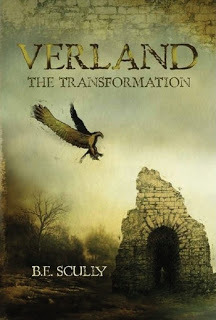
Published on November 07, 2011 14:15
November 4, 2011
One Day only Sale at Books on Board
Published on November 04, 2011 13:46

